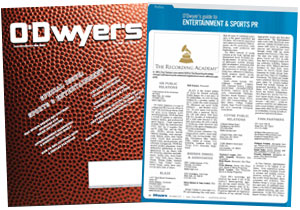|
|
When interviewing a prospective hire, or talking to students interested in entering the PR industry, I usually ask them why they want to work in communications. This common question typically leads to a common response — “I’m a people person,” or something of that nature. It’s clear to me, however, that this is not a field for the “people-person,” but rather, the “answer-person.”
When a client wants to buy a new car, we direct them to our team for a referral. If a client has a daughter looking at a college, we want to set up the tour. And if they’re going out of town and don’t ask us for a hotel or restaurant recommendation, we’ll feel we haven’t done our job. What is that job, you ask?
|
|
It’s not anything that you’d have on a business card or in an email signature. It’s about being the person that people come to for answers when there is no answer. And you don’t get that job; you earn that job. As PR professionals, we work to earn it every day.
Answers are never more important than in a time of crisis. It’s easy to have the answers when the question is about something as simple as where to eat dinner, but can you have sound judgment and make quick decisions when your client’s reputation is on the line?
That is where our team’s background in sports comes into play. It could be argued that a sporting event is, by its very nature, a crisis. Think about it:
• There is a struggle between competing interests that can have far reaching effects on the community.
• The results are unknown and hard to accurately predict.
• Quick decisions are the norm; you rarely have time for a second opinion.
• Large sums of money could be at stake.
• In most instances, the greatest success is a team success.
• There is a lot of attention from the media and the public.
• How one handles the event can make or break their career.
Our sports team comes from diverse backgrounds in the sports world. We’re comprised of former college athletes, former television sports anchors and former sports writers. The experiences we’ve had on the track, on the course and on the field are put into play on a daily basis as we advise our clients through tough situations. Along the way there have been a number of lessons learned:
Train for situations, act on conditions
Jack Nicklaus once said, “I never hit a shot, even in practice, without having a very sharp, in-focus picture of it in my head. It’s like a color movie.” From a physical standpoint, few will ever match the skillset that Nicklaus brought to the course, but it was his mental approach that made him second to none. We have to get in the habit of making good decisions. We can’t anticipate every detail, but we can perfect our form. Nicklaus had a repeatable swing that he knew he could depend on when the pressure was high, the winds were blowing and his muscles were tired. As communicators, we need to hone our skills so that we can be trusted to make sound judgments in a time of crisis.
Know when to take a pitch
As Babe Ruth once said, “Every strike brings me closer to the next home run.” With this in mind, one of the most important skills we can bring to a crisis is offering a proper evaluation of the situation and advising the client on what pitches are worth swinging at, as well as what pitches to let go by. One of our company’s founders, Glen Jackson, likes to equate what we do as communications consultants in this way — we are the ones who advise our clients when to push the accelerator and when to step on the brake. Is it a challenge or a crisis? Wisdom in determining the level, tone and type of response required for each crisis situation can be one of the most valuable assets we bring to the table.
Don’t look back until the game is over
Being adept at communicating through a crisis means that decisive decisions must be made and not second-guessed. There will be time, once the crisis ends, to reflect and evaluate. Only 23 players have tossed a perfect game in MLB history (or 24 if, like us, you think Armando Galarraga beat the runner to the base). In much the same way, very few organizations have or will perfectly handle reputational crises. The more we become comfortable with making decisions and not getting bogged down, the more effective we become in crisis. It is incumbent upon us to step back and help clients move beyond the paralysis that happens in crisis situations and move the ball down the field.
Which gets back to being the “answer people.” As the nature of our business becomes more integrated, we must be knowledgeable enough on a host of broad issues to provide sound counsel to our clients. This is never more important than in times of crisis. If we have built up that bank of trust with our clients with regard to the small things, then we will have a seat at the table when the large decisions are being made.
Does that mean we have all of the answers? Of course not. But, being a good counselor isn’t about having all of the answers. Rather, it is about understanding the problem, offering a strong solution and then standing with our clients until the final whistle blows.
* * *
Bryan Harris Bryan Harris is Senior Counsel and Sports Practice Leader at Jackson Spalding.




 Brunswick Group handles Endeavor, which has launched a review of strategic alternatives at the sports and entertainment combine as CEO Ari Emanuel believes Wall Street undervalues his company.
Brunswick Group handles Endeavor, which has launched a review of strategic alternatives at the sports and entertainment combine as CEO Ari Emanuel believes Wall Street undervalues his company. MWWPR has been retained by SportBLX to lead communications for the launch of a platform that allows fans and investors to own shares of unique assets in sports.
MWWPR has been retained by SportBLX to lead communications for the launch of a platform that allows fans and investors to own shares of unique assets in sports. DraftKings is betting on Donald Trump-connected Ballard Partners to help it achieve its economic development and regulatory relief goals in Washington. (1 reader comment)
DraftKings is betting on Donald Trump-connected Ballard Partners to help it achieve its economic development and regulatory relief goals in Washington. (1 reader comment) On November 15, “Ford v Ferrari” will roar into theaters, packing a publicity boost for two great global auto brands right on the marquee. Here's a Top Ten list of films in which a brand played a starring role. (1 reader comment)
On November 15, “Ford v Ferrari” will roar into theaters, packing a publicity boost for two great global auto brands right on the marquee. Here's a Top Ten list of films in which a brand played a starring role. (1 reader comment) Steven Spielberg’s Amblin Partners has brought on Dan Berger as executive vice president and head of communications.
Steven Spielberg’s Amblin Partners has brought on Dan Berger as executive vice president and head of communications.


 Have a comment? Send it to
Have a comment? Send it to 
No comments have been submitted for this story yet.